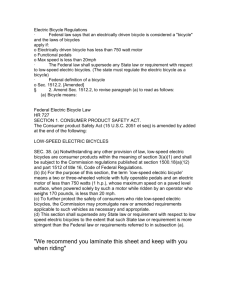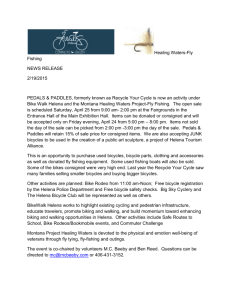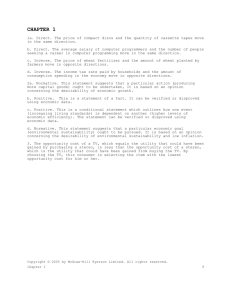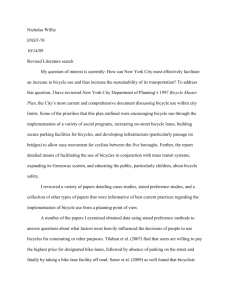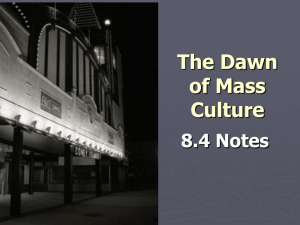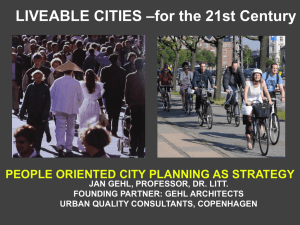Bicycle as socio-cultural indicator
advertisement
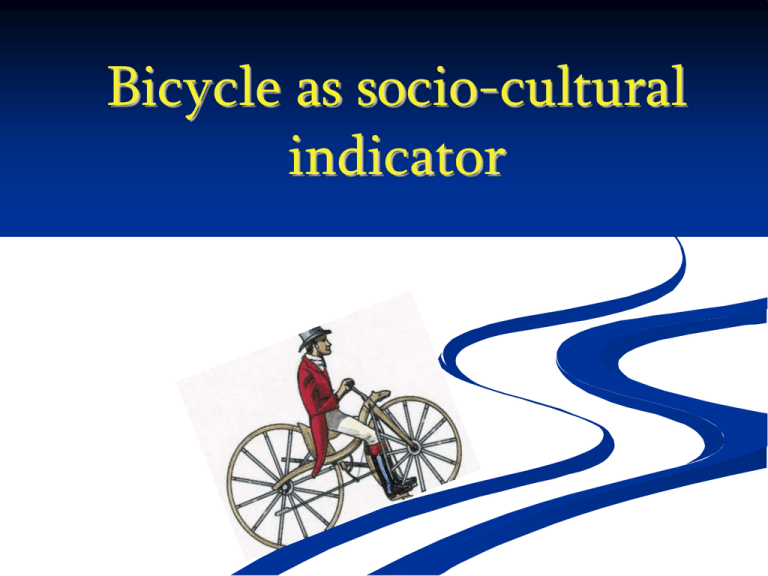
Bicycle as socio-cultural indicator A little history… The first bicycle and its appearance • • ”The Walking Machine” was invented by Baron von Drais in 1817; The design -a structure which was made of wood and 2 in-line wheels with the same dimensions, but no pedals Velocipede/”Boneshaker” In 1865, finally were attached to the front wheel of “The walking Machine” , THE PEDALS. After the inovation made, the machine was called “Velocipede” which its meaning was :”fast-foot”. 1870 - High-Wheel Bicycle •The high-wheel bicycle was the first appearance of an all metal machine and the first machine to be called a bicycle; •The pedals were once again attached to the front wheel and rubber tires were used in addition to long spokes on the larger front wheel. After some researches people discovered that the larger front wheel helped travel with less pedaling; 1880's - High-Wheeled Tricycle • This device was designed specifically for ladies with long skirts and corsets, in order to help them ride with decency. •Many of the mechanical inventions, such as steering and band brakes, for automobiles were originally developed for tricycles. 1880's - Hard-Tired Safety •The design of the bicycle changed back to become similar to the "Walking Machine“; • Metal was used to make a chain and sprocket, and two wheels of the same size were once again implemented. •The additions of gears allowed for the bicycle to have similar speeds as the highwheel bicycle. Hard rubber tires were still used, and the ride remained more comfortable than the rides of any of the high-wheeled designs. 1888 - Pneumatic Tire •Now, with the use of the tricycle and the pneumatic tire, comfort and safety could both be contained in the same machine; •The popularity of these additions increased, the bicycle becaming cheaper and the methods of manufacturing, more efficient; After the 1890’s, people started riding bicycles in a large number, because it was a good investment and a cost-efficient method of getting places; The improved bicycle became a commodity and the prices started to decrease. This popularity allowed the starting of mass production of bicycles. The bicycle in relationship with the society and the culture When the bicycle was invented, people never thought that this “machine” will be closely related to culture and society. Well, sometimes unexpected things can happen, like in this case, considering that the appearance of the bicycle ifluenced the entire world! Helping the Environment •Cycling is not only important to the health of the people riding, but also those of the surrounding environment •The bicycle does not pollute any air or sound. More bicycles, less cars, more green space. In conclusion, a healthy enviroment for all of us. Helping our health •A lot of diseases, like obesity or cardiovascular diseases are increasing. But, we all have a sedentary lifestyle, because we find no time for practcing sports. •We can use the bicycle in our daily activities, and in this way we cand get the “sports benefits”; Economical help •We all need a device for our mobility(in a faster way), but cars are not “available” for all of us. In this case, bicycles are the most useful for us. •Bicycles are more cheaper than cars, and they don’t need any taxes or fuels to be paid; EuroBike in France France Tour The involvement in culture •The appearance of bicycles and their evolution, the inovations according this device and the changements made by the first called “The Walking Machine”, have led to the apparition of museums and important exhibitions of bicycles in the entire world • In sports, cycling and the competitions dedicated to it, are bringing more and more tourists and lovers of bicycles together, spreading the culture in terms of cycling, bikes, athletes of this sports and the history of this machine,all over the world. Technical MuseumBucharest Conclusions Starting with their appearance, bicycles changed human’s life in his living environs: social, economical, cultural and nature: Equality between men and women; Less pollution; The safety of money; No more wasting fuel; “Mens sana in corpore sano”; Museums, exhibitions, competitions of cycling =tourists =the spread of bicycles and sports; =money; Thank you for your attention! Tudor Andra
